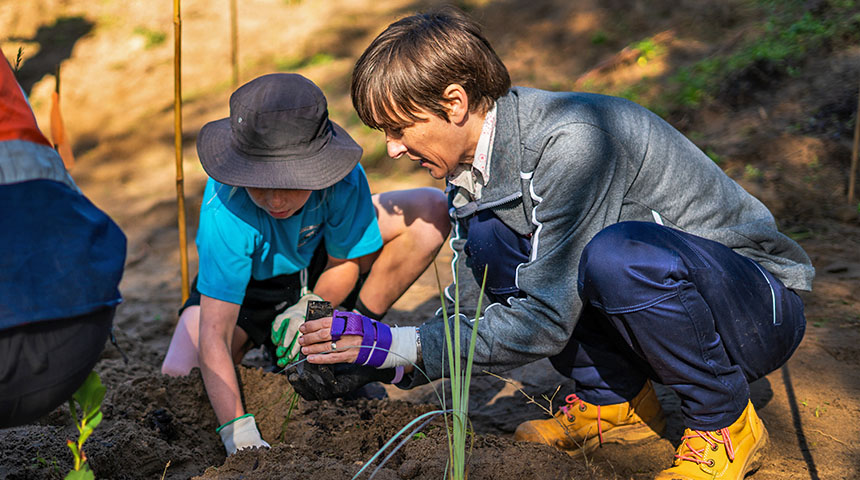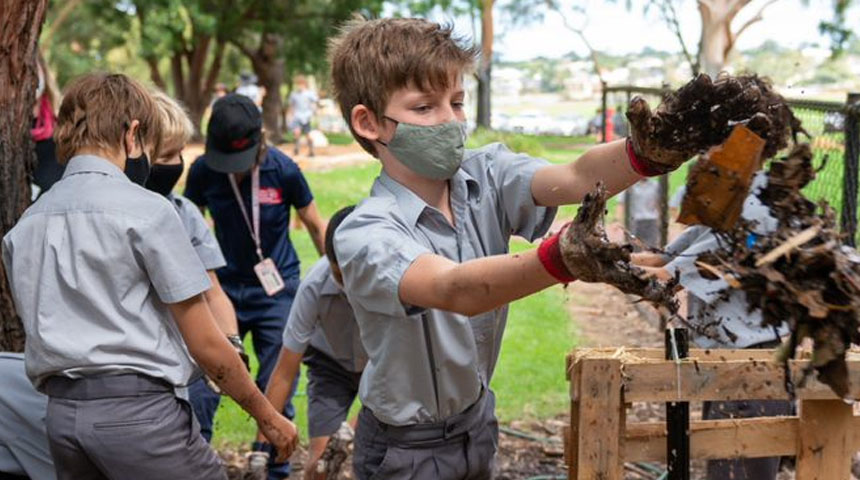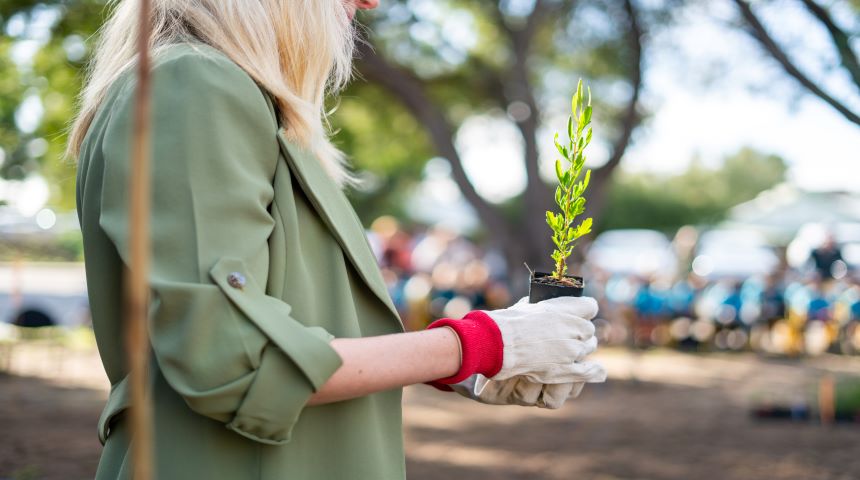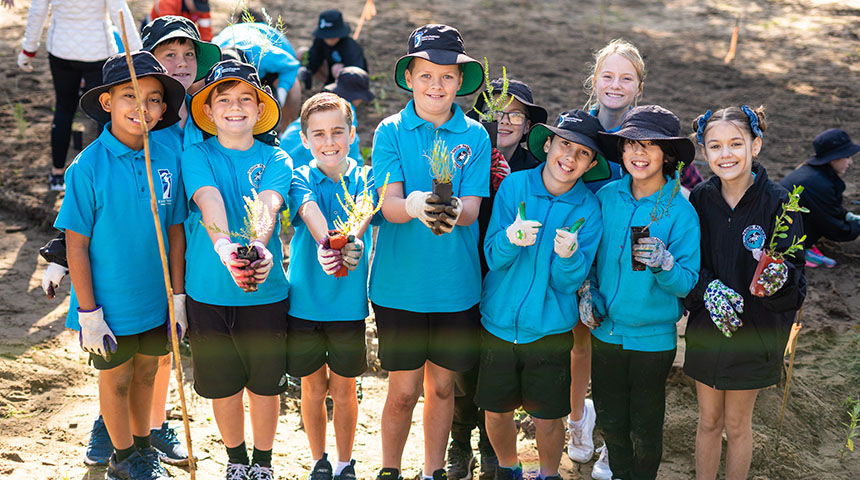
A fascination with the natural world, a passion for citizen science and determination to save the planet has led a Murdoch University researcher to an esteemed international listing.
Murdoch University’s Dr Grey Coupland has been announced as one of two Australian projects featured on the United Nations Education, Scientific and Cultural Organisation’s (UNESCO) 2021-22 Green Citizens campaign.
The listing acknowledges Dr Coupland’s Miyawaki forest outreach program that sees Western Australian citizen scientists plant dense pocket-forests in urban areas, based on a method developed by Japanese botanist Professor Akira Miyawaki.
Dr Coupland said she felt privileged to be recognised by UNESCO and calls upon global citizen scientists to get involved and help protect the environment.
“I feel truly honoured to have my citizen science outreach program listed on this global platform. I hope this program, along with the many others listed by the UNESCO Green Citizens project, encourages people from around the world to reach out and address the environmental challenges we are facing.
Groundswell movements led by citizens can be extremely powerful. It is truly within our capacity to positively impact our environment locally, and from this, make a difference on a large scale.” Dr Grey Coupland
Up to this point, the outreach program has brought STEM activity into schools by incorporating citizen science into the curriculum, enabling students to see first-hand how their actions can make a positive difference to the environment.
The Miyawaki method, in which densely planted forests are created using locally indigenous species, offers a solution to help rehabilitate degraded areas and provides people with the capacity for tangible local environmental action.
“Through this program, Western Australian students can get their hands dirty and see for themselves the benefits of a circular economy. They see their food waste, and that of local businesses, used in a compost system they help to set up, with the compost added to the soil prior to planting, assisting the growth of their very own forest. I think this is a practical way to show that acting sustainably is really not difficult and can be part of our everyday lives.”
Dr Coupland said the research over of the next few years will aid in assessing how well the Miyawaki method is suited to the Australian environment using Australian species, while also teaching school students that their actions can have tangible environmental outcomes.
“The students take monthly measurements on plant growth rates, soil and air temperature and collect data on animal diversity, while I conduct my own research right alongside them,” she said.
“Importantly, this study will provide options to community decision and policy makers regarding future urban revegetation and cooling programs.”

In 2022, Dr Coupland will plant eight more forests across Western Australian schools, at Statewide Services and a community garden.
Professor Simon McKirdy, Pro Vice Chancellor of the Harry Butler Institute congratulated Dr Coupland on the significant recognition.
“From since she was a child, Dr Coupland’s dream was to save the world and save species from extinction,” he said.
Bringing the Miyawaki planting technique to Australia, planting the first tiny forest in Western Australia, and heading up an outreach program to empower the next generation of eco-warriors is inspiring.” Professor Simon McKirdy
“It’s fantastic to see she is getting esteemed recognition on a global scale that she truly deserves.”
The UNESCO collaborative campaign highlights 100 inspiring environmental projects across the globe that support citizen engagement for the planet.
Those awarded the prestigious listing see their project published on the world-wide campaign platform.
The public is now being urged to pay a visit the UNESCO Green Citizens website, discover meaningful projects and begin their journey to foster environmental change.
About Miyawaki Forests

Miyawaki forests (also known as pocket or tiny forests) are popular for urban greening to rehabilitate degraded areas and increase biodiversity in urban areas.
They're small (< 200 m2) densely planted forests created using up to 30 different native species, anecdotally grow up to 10 times as fast as traditionally planted forests and support up to 100 times the diversity.
Indigenous plants are able to grow up to 10 times as fast due to extensive soil remediation, dense planting, use of locally endemic species adapted to the environment and care of the forests.
About the Project

Dr Coupland is partnering with Carbon Positive Australia and SUGi for this work. She is also SUGi’s Lead Scientist as part of their global rewilding campaign.
The outreach program brings Miyawaki forests into schools and community areas across urban and regional areas of WA and engages children with climate action. In this outreach program, forests are planted by citizen scientists under the guidance of Dr Grey Coupland.
Planting these pocket forests engages school children with climate action at a local level, empowering them to become citizen scientists and showing them that their actions can have tangible environmental outcomes.
Last year, Dr Coupland partnered with South Padbury Primary School (SPPS) and SUGi to plant the first ever Miyawaki forest in an Australian school and the first Miyawaki forest in Western Australia. Planet Ark Seedling Bank sponsored trees for planting.
In 2022 Dr Coupland will plant eight more forests across Perth and regional areas. In partnership with Carbon Positive Australia, she will plant Miyawaki forests at Eddystone Primary School, Poseidon Primary School, Makybe Primary School, Baldivis Secondary College, Merriwa Primary School and Brookton Community Gardens. She is also bringing the outreach program to Aquinas College and Statewide Service (Education Dept) at Padbury.